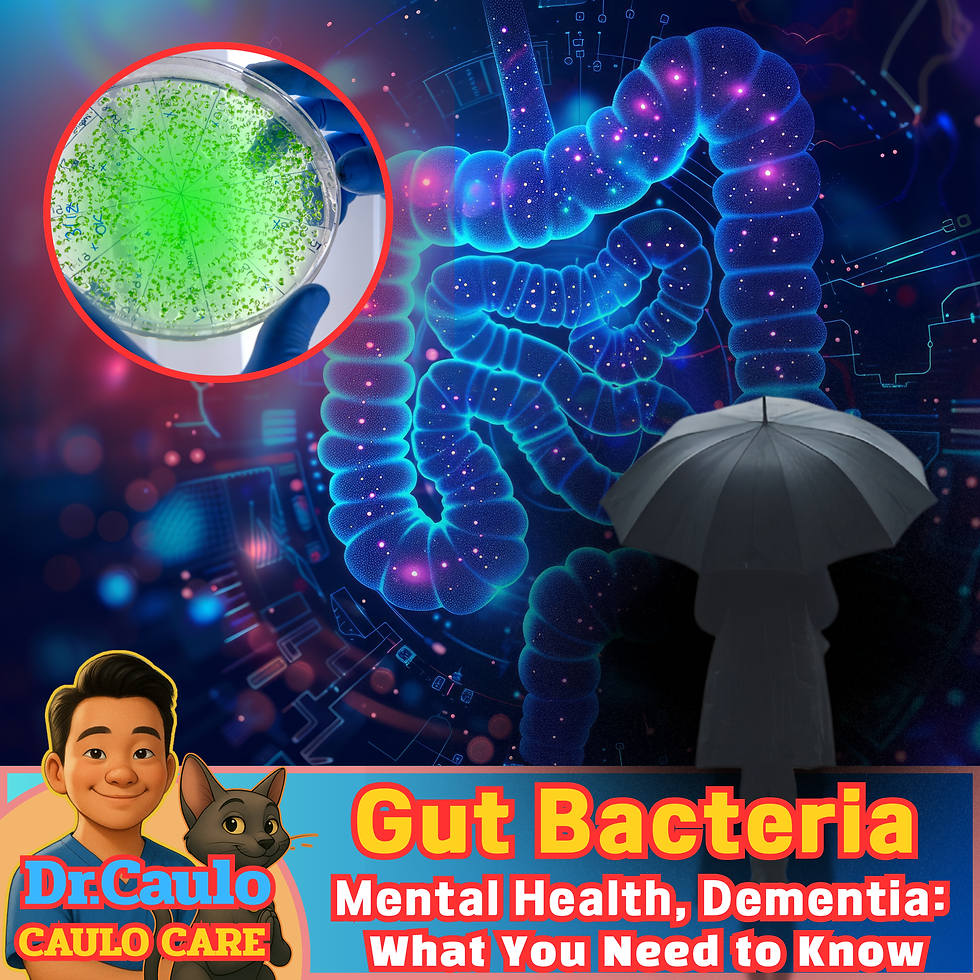Understanding Chronic Constipation: Insights from Traditional Chinese Medicine
- caulocare
- May 5, 2025
- 6 min read

Chronic constipation is more than just an occasional inconvenience; it can significantly impact your daily life. If you find yourself struggling with this condition, it’s important to pay attention to your body’s signals and understand the underlying causes. While conventional medicine offers numerous treatments, Traditional Chinese Medicine (TCM) provides a distinct perspective that can offer relief and deeper insights into this common problem.
What Is Chronic Constipation?
Chronic constipation is often described as having fewer than three bowel movements per week over a period of several weeks or longer. This condition can include a variety of symptoms, such as straining during bowel movements, producing hard stools, feeling a lack of complete evacuation, or needing assistance, such as laxatives, to facilitate the process. According to the Gastroenterological Society, chronic constipation affects about 16% of the global population, highlighting its widespread nature.
Why Does It Happen? (Causes & Mechanisms)
Dietary Causes
Diet significantly influences bowel health. A diet low in fiber, which averages about 15 grams per day for many adults, can hinder normal stool formation. For comparison, the recommended fiber intake is about 25 to 38 grams per day. Insufficient water consumption can lead to hard, dry stools that are challenging to pass. Increasing fiber-rich foods, such as fruits, vegetables, and whole grains, can promote regularity.
Sedentary Lifestyle
Physical activity is key for digestive health. Engaging in regular exercise strengthens the muscles that help move stool through the colon. Research suggests that just 30 minutes of moderate exercise most days of the week can significantly improve bowel function and reduce constipation symptoms.
Ignoring the Urge
The habit of ignoring the natural urge to defecate can worsen constipation. Research indicates that repeated postponement can dull the sensory signals that inform the body when it's time to go, making it harder to respond when the urge does arise. Regularly responding to these urges can help maintain a healthy bowel routine.
Medication Side Effects
Medications can be a significant factor in chronic constipation. Pain relievers like opioids, certain antidepressants, iron supplements, and some antacids containing aluminum or calcium are common contributors. Understanding how these medications influence your body can empower you to discuss alternatives or additional treatments with your healthcare provider.
Medical Conditions
Chronic constipation can arise from various medical conditions that impact gut motility. Conditions such as diabetes, hypothyroidism, Parkinson's disease, and multiple sclerosis can disrupt normal bowel function. About 30% of individuals with Irritable Bowel Syndrome (IBS) experience constipation, indicating that this issue is intertwined with various health concerns.
Pelvic Floor Dysfunction
The pelvic floor muscles that support bowel movements can become less coordinated due to childbirth or surgical procedures, leading to difficulties in bowel habits. Understanding this could help individuals seek targeted therapies to strengthen these muscles.
⚠️ Why It’s Dangerous If Ignored
Chronic constipation can cause hemorrhoids, anal fissures, fecal impaction, and rectal prolapse.
Long-term stool retention may increase inflammation and risk for diverticulosis or even colon cancer.
It can significantly reduce quality of life, causing fatigue, bloating, and mood changes.
🛡️ Prevention & Self-Care
1. Increase Fiber Intake
Aim for 25–30 grams per day from whole fruits, vegetables, legumes, and whole grains.
2. Hydrate Properly
Drink 6–8 cups of water daily (more if you're active or live in a hot climate).
3. Exercise Regularly
Brisk walking, yoga, or abdominal stretches improve bowel motility.
4. Establish a Toilet Routine
Sit on the toilet at the same time daily (ideally morning after breakfast).
Relax, allow at least 10 minutes, and avoid straining.
5. Don’t Ignore the Urge
Responding promptly helps maintain your body's natural rhythm.
6. Try the Squat Position
Use a footstool to raise your knees above your hips to straighten the rectum for easier passage.
💊 Medical Treatment Options
1. Bulk-forming laxatives
Add fiber to the stool (e.g., psyllium).
2. Osmotic laxatives
Draw water into the bowel (e.g., polyethylene glycol, lactulose).
3. Stimulant laxatives
Encourage intestinal contractions (e.g., senna, bisacodyl) — for short-term use.
4. Stool softeners
Make stool easier to pass (e.g., docusate sodium).
5. Prescription Medications
For chronic, treatment-resistant cases (e.g., linaclotide, lubiprostone).
6. Biofeedback Therapy
Retrains pelvic floor muscles in cases of muscle dysfunction.
In TCM, What Is Constipation?
Traditional Chinese Medicine views constipation as an imbalance of qi (vital energy), blood, yin, yang, and body fluids, which are essential for the proper functioning of the large intestine (Da Chang).
In TCM, normal bowel movements hinge on the smooth movement of qi, sufficient moisture (provided by yin and blood), and unhindered meridians. This holistic approach underscores the connection between various bodily systems and suggests that symptoms often stem from deeper energetic imbalances.
❓ Why Does Constipation Happen in TCM?
1. Heat Accumulation in the Intestines (Re Jie)
Caused by excessive consumption of spicy, fried, or greasy foods.
Heat dries fluids → stools become hard and difficult to pass.
Often accompanied by bad breath, thirst, red tongue, and irritability.
2. Qi Deficiency (Qi Xu)
Weak digestive qi cannot push the stool downward.
Common in elderly, chronically ill, or postpartum individuals.
Characterized by fatigue, shortness of breath, spontaneous sweating, and soft but difficult-to-pass stools.
3. Blood Deficiency (Xue Xu)
Blood nourishes and moistens the intestines.
Without enough blood, the bowel becomes dry.
Symptoms: pale complexion, dizziness, palpitations, and dry stools.
4. Yin Deficiency (Yin Xu)
Internal dryness due to lack of body fluids.
Often seen in people with chronic illness, night sweats, dry mouth, and a red tongue with little coating.
Stools are dry like pellets; thirst is common.
5. Qi Stagnation (Qi Zhi)
Stress, emotional suppression, or irregular lifestyle disrupts the flow of qi.
Qi gets stuck in the Liver system, affecting the Large Intestine's movement.
Results in bloating, abdominal tension, and alternating constipation and loose stools.
6. Cold Accumulation (Han Zhi)
Cold contracts and slows intestinal movement.
Found in people who overconsume cold/raw food or live in cold environments.
Symptoms: cold limbs, abdominal pain relieved by warmth, and difficulty passing stools.
🌿 How to Prevent Constipation in TCM?
1. Eat in Harmony with Your Constitution
Warm, cooked foods for cold or deficient types.
Cooling, moistening foods (like pears, honey) for heat or yin-deficient types.
2. Avoid Cold or Raw Foods Excessively
Especially for those with weak digestion (Spleen Qi Deficiency).
3. Keep a Regular Schedule
Eat and sleep at consistent times.
Go to the bathroom every morning when the Large Intestine meridian is most active (5–7 a.m.).
4. Manage Emotions
Avoid long-term stress, anger, or frustration — these disrupt Liver qi and the bowel.
5. Hydrate Properly
Drink warm water throughout the day to moisten the intestines.
Avoid iced drinks that weaken the digestive fire.
🛠️ Treatment Methods in TCM
1. Herbal Medicine
Formulas are chosen based on your root pattern (e.g., Ma Zi Ren Wan for dryness, Liu Mo Tang for stagnation).
Herbs may moisten, purge heat, move qi, or tonify deficiencies.
2. Acupuncture
Common points:
ST25 (Tian Shu) – regulates the intestines
LI11 (Qu Chi) – clears heat
SP15 (Da Heng) – moves qi in the abdomen
BL25 (Da Chang Shu) – benefits the large intestine
LI4 (He Gu) – moves qi and regulates the bowels
3. Tui Na Massage & Gua Sha
Abdominal massage can help move qi and relieve blockage.
Scraping the back or abdomen to stimulate digestion.
4. Dietary Therapy
Use food as medicine: white sesame seeds, cooked spinach, sweet potatoes, papaya, lotus root soup, or soaked goji berries.
🧘♀️ Self-Care You Can Do Daily
Drink warm sesame or honey water in the morning.
Massage your abdomen clockwise every night before bed.
Practice deep breathing or Tai Chi to move qi and calm the mind.
Soak feet in warm water before bed to draw qi downward and help the intestines relax.
Chew food thoroughly and eat mindfully without screens or stress.
Final Thoughts
Chronic constipation is a complex condition that goes beyond simply being a nuisance. It can reflect deeper health issues, especially from the lens of Traditional Chinese Medicine. By integrating TCM practices with dietary and lifestyle changes, you may find effective ways to restore gut health and promote regular bowel movements.
Listening to your body's signals is crucial. If you're dealing with chronic constipation, consider exploring both conventional and alternative methods, including those offered by TCM. This balanced approach might just be the key to regaining control over your digestive health and overall well-being.
❌This information is only educational and should not be construed as medical advice.
Everything must be balanced, and the suggestions may not apply to you.
A specialist doctor should be consulted for any medical advice or diagnosis.
BOOK AN APPOINTMENT NOW!
Acupuncture near me at Forest Hill, NY
🔶🔷🔶🔷🔶🔷🔶🔷🔶🔷🔶🔷
Dr. Phumlarp Caulo LA,c, MAc. OM, DAHM
Doctor of Acupuncture/Chinese Medicine
Caulo Care Acupuncture
🔖 By appointment only
☎️+1 (929) 269-4549




Comments